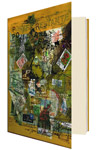In his introduction to Poste Restante (translation: “residual mail”), Derek White describes his book as a collection of “nocturnal histories” written “in the wake of sleep.” To put it another way, Poste Restante is a sort of dream journal. Over the course of twenty years, while living in various places around the world (South Dakota, the Cook Islands), White wrote fiction while the dream world still clung to him, in an effort to document his life travels through intuition. There’s rarely any clear connection between story and place—stories written in New York and Arizona take place in India and Panama—but White is less interested in facts than in the unstable, representational nature of locations in dreams, which he calls the “idealized concept” of a place. So, in this sense, the book is actually a dream-travel journal.
Without reading the introduction, Poste Restante seems like a collection of very short stories with signed dates, places, and surreal scenarios. Labeling these “dreams” is just a way of giving White’s imagination free reign. Yet his ability to clearly translate the logic of dream-life is what makes this a specialized, noteworthy work of fiction. His descriptions border on Dada: “A rooster with razor blades strapped to his feet was displayed in a fish tank in the rear of the restaurant.” His actions seem linked by a chain of nonsequiturs: “I continued running lost through the streets. Finding a litter of stray puppies, I kept the runt. My feet kept running but I wasn’t going anywhere.” In one story, he gets so excited about being at a Radiohead concert that he takes off in flight, and then crashes, making “a crater in the ground the exact shape of (his) body—like in the cartoons.”
Also included are charts, drawings, photographs, and pieces of imaginary mail. Sometimes this material makes its way into the story—a stamp with a rattlesnake is next to a story about rattlesnakes—and clarifies the text (he actually labels them Exhibit A, B, etc.). But sometimes the images just add an undecipherable ambiguity, and while this can be frustrating, it’s also what makes this the sort of labyrinthine artifact you want to keep on your shelf to savor for many years.
Published in places like Pindelyboz, elimae, and Snow Monkey, the stories in Poste Restante represent some of the most enigmatic work being published on flash-fiction websites and in journals around the country. White demonstrates the elasticity of the genre and how the compressed format can allow for some of the wildest creative leaps in new fiction. Most notably, though, he shows how seemingly disparate shorts can react when lined up together. With a subject as hermetic as dream-life, the collection could easily crumble apart as episodic nonsense, but White places himself inside the narrative and becomes the connective tissue that keeps everything flowing. From one sentence to another, he remolds himself, from a fictional character to a memoirist, from a Panamanian boy to an albino, ultimately becoming a wraithlike figure looming throughout the pages. He communicates not only his “idealized concepts” of location and dream but also something personal about the dreamer. By never consigning himself to a distinctive personality, he re-creates the amorphous aspects of “the self” in dreams and builds a transcendent voice, as complex as those heard in David Markson’s fiction, and as eerily formless as the narrators of our own indescribable dreams.





